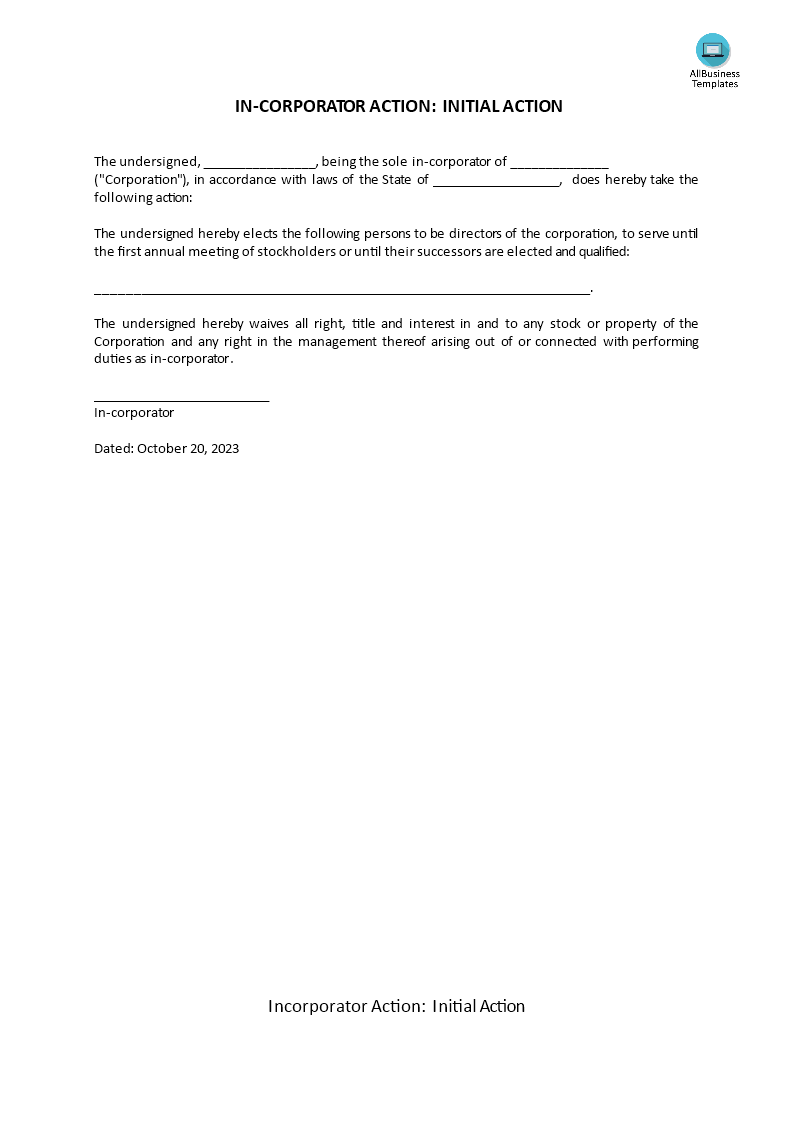Initial Incorporator Action
Save, fill-In The Blanks, Print, Done!

Download Initial Incorporator Action
Today: USD 1.99
Download It Now

Available premium file formats:
Microsoft Word (.docx)- This Document Has Been Certified by a Professional
- 100% customizable
- This is a digital download (23.71 kB)
- Language: English
- You will receive a link to download the file as soon as your payment goes through.
- We recommend downloading this file onto your computer.
How to write an initial incorporator action? How does an incorporator fulfill his or her duties and responsibilities? Our template is designed to help you quickly and easily create an Initial Incorporator Action. It includes all the necessary information and instructions to guide you through the process. Download this Initial Incorporator Action now!
An Initial Incorporator Action refers to the first official action taken by the incorporator or incorporators of a corporation during the process of forming a new corporation. The incorporator is an individual or entity responsible for initiating the process of incorporating a company and may be involved in preparing and filing the necessary legal documents to create the corporation.
Here are the key points to understand about an Initial Incorporator Action:
- Incorporator's Role: The incorporator is often the individual or entity responsible for founding the corporation. In some cases, a corporation may have multiple incorporators, and they collectively play a role in the initial setup of the company.
- Corporate Formation: The initial incorporator action typically involves taking the necessary steps to legally form the corporation. This includes selecting a corporate name, preparing the articles of incorporation (also known as the certificate of incorporation or corporate charter), and filing these documents with the appropriate state agency, such as the Secretary of State's office.
- Adopting Bylaws: Part of the initial action may involve adopting corporate bylaws. Bylaws are internal rules and regulations that govern the corporation's operations and management. They establish procedures for holding meetings, electing directors, appointing officers, and other key governance matters.
- Election of Directors and Officers: The incorporator or incorporators may also take action to appoint the initial board of directors and officers of the corporation. These individuals are typically named in the articles of incorporation or bylaws.
- Other Organizational Matters: Any other necessary organizational matters may be addressed in the initial incorporator action. This could include selecting a registered agent, designating the principal place of business, and adopting resolutions related to corporate formation.
- Documentation: The actions taken during the initial incorporator action are documented in written resolutions or minutes of the meeting (if there is a meeting) or in written consents signed by the incorporator(s). These documents serve as evidence of the incorporator's actions and are often required when dealing with third parties, such as banks, investors, or regulatory authorities.
- Filing and Compliance: Once the initial incorporator action is completed and the necessary documents are filed with the state, the corporation becomes a legally recognized entity. The corporation must also comply with ongoing reporting and regulatory requirements, depending on the jurisdiction in which it is formed.
It's important to note that the specific requirements and procedures for an Initial Incorporator Action can vary by jurisdiction and may be subject to state or country-specific laws and regulations.
Download this professional legal Incorporator Action template if you find yourself in this situation and save yourself time, effort and probably reduce some of the lawyer fees! Using our legal templates will help you reach the next level of success in your education, work, and business! However, we still recommend you to consider consulting a local law firm in case of doubt to support you in this matter.
DISCLAIMER
Nothing on this site shall be considered legal advice and no attorney-client relationship is established.
Leave a Reply. If you have any questions or remarks, feel free to post them below.
Related templates
Latest templates
Latest topics
- Excel Templates
Where do I find templates for Excel? How do I create a template in Excel? Check these editable and printable Excel Templates and download them directly! - GDPR Compliance Templates
What do you need to become GDPR compliant? Are you looking for useful GDPR document templates to make you compliant? All these compliance documents will be available to download instantly... - Google Docs Templates
How to create documents in Google Docs? We provide Google Docs compatible template and these are the reasons why it's useful to work with Google Docs... - IT Security Standards Kit
What are IT Security Standards? Check out our collection of this newly updated IT Security Kit Standard templates, including policies, controls, processes, checklists, procedures and other documents. - Letter Format
How to format a letter? Here is a brief overview of common letter formats and templates in USA and UK and get inspirited immediately!
cheese
